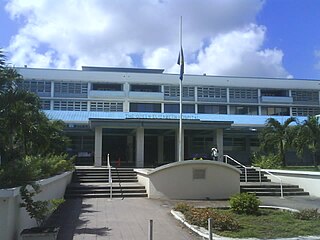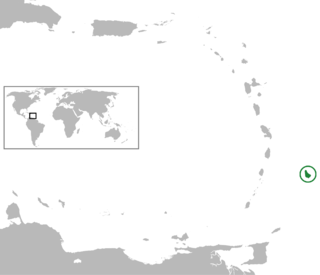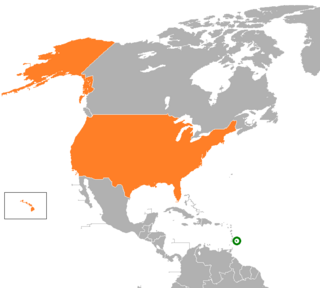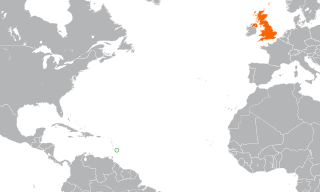Related Research Articles

Barbados is an island country in the Lesser Antilles of the West Indies, in the Caribbean region next to North America and north of South America, and is the most easterly of the Caribbean islands. It lies on the boundary of the South American and the Caribbean Plates. Its capital and largest city is Bridgetown.

Bridgetown is the capital and largest city of Barbados. Formerly The Town of Saint Michael, the Greater Bridgetown area is located within the parish of Saint Michael. Bridgetown is sometimes locally referred to as "The City", but the most common reference is simply "Town". As of 2014, its metropolitan population stands at roughly 110,000.
The Ontario Health Insurance Plan, commonly known by the acronym OHIP, is the government-run health insurance plan for the Canadian province of Ontario. OHIP is funded by a payroll deduction tax by residents who are gainfully employed, by businesses in the province of Ontario, and by transfer payments from the Government of Canada.

A clinic is a health facility that is primarily focused on the care of outpatients. Clinics can be privately operated or publicly managed and funded. They typically cover the primary care needs of populations in local communities, in contrast to larger hospitals which offer more specialized treatments and admit inpatients for overnight stays.

The Queen Elizabeth Hospital (Q.E.H.) is located in Barbados' capital city Bridgetown, which is located in the parish of Saint Michael. The hospital is the main General Hospital for the southern part of the island.

The following is an alphabetical list of topics related to the nation of Barbados.

Healthcare in Malaysia is under the purview of the Ministry of Health of the Government of Malaysia. Malaysia generally has an efficient and widespread system of health care, operating a two-tier health care system consisting of both a government-run public universal healthcare system along with private healthcare providers. Within the chronically underfunded public universal healthcare system, specialist services are either free or have low user fees for procedures ; as such the public healthcare system suffers from high demand, routine congestion, long wait lists, chronic widespread delays along with persistent shortages in healthcare personnel, medical equipment and healthcare supplies. Therefore, private healthcare providers play a pivotal role in providing specialist consultants and general practitioner (GP) services to the Malaysian population; the private healthcare providers complements or supplants the public healthcare system in terms of availability, types of treatments provided and types of materials used.

The monarchy of Barbados was a system of government in which a hereditary monarch was the sovereign and head of state of Barbados from 1966 to 2021. Barbados shared the sovereign with the other Commonwealth realms, with the country's monarchy being separate and legally distinct. The monarch's operational and ceremonial duties were mostly delegated to her representative, the governor-general of Barbados.

Mia Amor Mottley, is a Barbadian politician and attorney who has served as the eighth prime minister of Barbados since 2018 and as Leader of the Barbados Labour Party (BLP) since 2008. Mottley is the first woman to hold either position. She is also Barbados' first prime minister under its republican system, following constitutional changes she introduced that abolished the country's constitutional monarchy.

The United States and Barbados have had cordial bilateral relations since Barbados' independence in 1966. The United States has supported the government's efforts to expand the country's economic base and to provide a higher standard of living for its citizens. Barbados is a beneficiary of the U.S. Caribbean Basin Initiative. U.S. assistance is channeled primarily through multilateral agencies such as the Inter-American Development Bank and the World Bank, as well as the U.S. Agency for International Development (USAID) office in Bridgetown.
Healthcare in Algeria consists of an established network of hospitals, clinics, and dispensaries. The government provides universal health care.

Healthcare in Singapore is under the purview of the Ministry of Health of the Government of Singapore. It mainly consists of a government-run publicly funded universal healthcare system as well as a significant private healthcare sector. Financing of healthcare costs is done through a mixture of direct government subsidies, compulsory comprehensive savings, national healthcare insurance, and cost-sharing.
Founded in 1966, the Saint Joseph Hospital is a medical facility now owned by the Government of Barbados. It is located in Ashton Hall area, which is located in the parish of Saint Peter. The hospital once served alongside the main general Hospital. The St. Joseph Hospital primarily served the northern parts of the island. In January 2011 it was announced the entire hospital was to be leased to overseas investors who had interest in it for medical tourism. The government later announced the investor to be Denver, Colorado-based American World Clinics ("AWC") under at least a 25-year lease.

Diplomatic relations between Canada and Barbados date back to 1907, when the Government of Canada opened a Trade Commissioner Service to the Caribbean region located in Bridgetown, Barbados. Following Barbadian independence from the United Kingdom in November 1966, the Canadian High Commission was established in Bridgetown, Barbados on 27 September 1973. There is a High Commission of Barbados in Ottawa and a Barbadian Consulate in Toronto. The relationship between both nations today partly falls under the larger gambit of Canada–Caribbean relations. As of 2014 it is estimated that as much as 8% of Canadian foreign investments in Barbados.

Relations between Barbados and China began on 4 September 1967 with Barbados recognizing the People's Republic of China from 30 May 1977, just over one decade after the eastern Caribbean island nation's independence from the United Kingdom.

The historical ties between the governments of Barbados and the United Kingdom of Great Britain and Northern Ireland (UK) are long and complex, including settlement, post-colonialism and modern bilateral relations. The two countries are related through common history spanning 339 years (1627–1966). Since the Barbadian date of political independence, these nations continue to share ties through the Commonwealth of Nations. Until becoming a Commonwealth republic in 2021, Barbados also shared the same Head of State, with Queen Elizabeth II as their Monarch.

A healthcare center, health center, or community health center is one of a network of clinics staffed by a group of general practitioners and nurses providing healthcare services to people in a certain area. Typical services covered are family practice and dental care, but some clinics have expanded greatly and can include internal medicine, pediatric, women’s care, family planning, pharmacy, optometry, laboratory testing, and more. In countries with universal healthcare, most people use the healthcare centers. In countries without universal healthcare, the clients include the uninsured, underinsured, low-income or those living in areas where little access to primary health care is available. In the Central and East Europe, bigger health centers are commonly called policlinics.

Healthcare in Belgium is composed of three parts. Firstly there is a primarily publicly funded healthcare and social security service run by the federal government, which organises and regulates healthcare; independent private/public practitioners, university/semi-private hospitals and care institutions. There are a few private hospitals. Secondly is the insurance coverage provided for patients. Finally, industry coverage; which covers the production and distribution of healthcare products for research and development. The primary aspect of this research is done in universities and hospitals.
Examples of health care systems of the world, sorted by continent, are as follows.
References
- ↑ James Thomas Flexner (1974). Washington: The Indispensable Man . p. 8.
- ↑ "Barbados". WHO. 2016. Retrieved 15 November 2018.
- ↑ "Barbados Government Fighting to Keep Nurses from Migrating". Caribbean 360. 23 October 2018. Retrieved 15 November 2018.
- ↑ "Health in Barbados". Barbados.org. Retrieved 15 November 2018.
- ↑ "Barbados Health Care". Totally Barbados. 2018. Retrieved 15 November 2018.